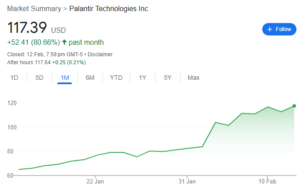Palantir’s Stock Rally: Is the Recovery Sustainable or a Short-Term Bounce?
![]() Ujjwal Maheshwari, February 13, 2025
Ujjwal Maheshwari, February 13, 2025
Over the past few months, Palantir Technologies (NDQ:PLTR) has made headlines due to a major surge in its stock price…a surge because investors think it’ll be a major beneficiary from the ‘DOGE era’. Elon Musk’s DOGE (Department of Government Efficiency) operates as a free-roaming group tasked with cutting the size of government.
Palantir, which is based in Denver, runs AI-driven data mining platforms that serve the defence and intelligence sectors. And investors think if DOGE ushers in an era of more AI-driven government processes, Palantir could be a major beneficiary. A fair thought at first glance, but of course Palantir is already a holder of government contracts. Have they not thought of the prospect that Palantir could be blamed for inefficiency and lose them?
Ultimately it is important to evaluate Palantir’s long-term potential to make informed investment decisions.
Recent Performance and Catalysts
Interest in this stock has long preceded the conception of DOGE – it is up nearly 400% in the last 12 months and is capped at over $250bn.

Much of this rally has been propelled by the company’s solid financials, not to mention interest in stocks exposed to AI. Palantir’s revenue for Q4 2024 was $828 million, a 36% year-over-year increase. Palantir’s government revenue growth for Q4 2024 should be checked against Palantir’s official earnings release. Government contracts remain a mainstay of Palantir’s revenue, a function of the firm’s close relationships with U.S. defence and intelligence services.
At first glance, that may cause concern. If DOGE finds that Palantir has been responsible for a lack of efficiency – its contracts could be in the firing line. But investors have tossed any thoughts of that to aside, and suspect the company’s algorithms could be a solution rather than a problem.
In addition to its government work, Palantir has had success in the commercial space. The company has broadened its reach to healthcare, finance, and supply chain analytics with its AI-powered platforms, which has helped diversify its sales base. The growing use of AI solutions across industries has made Palantir a major player in the AI field, sparking investor interest.
Valuation Concerns and Risks
Palantir’s growth has been remarkable, but analysts have questioned its valuation. Palantir is trading at high multiples, and its valuation is much higher than the industry average. It is 213.4x P/E for CY25. No that’s not a typo – it is two hundred and thirteen times P/E! It’s EV/EBIDA is 163.8x, its EV/Revenue is 69.7x and its PEG is 8.3x.
These high stock valuations raise questions about how far the stock can rise before growth slows down. Analysts covering the stock have a target price of $84.70, more than a quarter below the current share price. Yes, there is a big divergence of opinion amongst analysts with 20 of them and their targets ranging from $18 and $125, but the latter does not suggest that much upside.
Should the company’s revenue growth prove unsustainable, or macroeconomic conditions put its government and commercial contracts at risk, the stock could face downward pressure. Moreover, increased competition from major players like Microsoft, Google, Amazon, IBM, and Snowflake could challenge Palantir’s position in the AI and data analytics sector.
Dependence on Government Contracts Is a Risk
Government spending may seem to only be going up in the US given how the debt ceiling keeps escalating. And that is fair to say, although specific priorities do change. Political priorities, budget constraints, and policy shifts can all affect where government spending goes, which could impact Palantir’s financial stability and growth trajectory.
Palantir’s CEO, Alex Karp, is optimistic that the government will continue to rely more on efficient data solutions, there is potential for increased scrutiny and cost-cutting to reduce government spending on contracts. Tough budget management by the U.S. government could hinder Palantir’s ability to capture or renew lucrative contracts, potentially stymieing long-term revenue generation.
Moreover, the race for government contracts is heating up, as new entrants and seasoned tech titans compete for a piece of the federal data analytics pie, all against the backdrop of ESG expectations, which can be burdensome and time-consuming for government agencies. Providers like Microsoft, AWS, and Google are increasingly marketing themselves as viable options, using their cloud computing experience to vie for government contracts. This shifting relationship highlights the importance for Palantir to cement its position in the industry and keep pursuing diversification opportunities.
Expansion into Commercial Sectors
Recognising the risks of over-dependence on government contracts, Palantir has made growing in the commercial sector a priority. Thanks to its leap into the commercial domain and the adoption of AI-powered technologies, Palantir has achieved significant revenue growth and growing market domination. Specifically, Q4 2024 reported a 64% increase in U.S. commercial revenue compared to the previous year. Commercial revenue figures have not been broken out in the latest financials, but the growing revenue highlights the success of its diversification strategy and the increasing demand for AI-driven data analytics solutions across sectors.
Several catalysts are driving Palantir’s expansion into the commercial space. Businesses in healthcare, finance, manufacturing, and other industries now recognise the value of pairing their data with AI-powered insights. These platforms, like Foundry and Gotham, assist enterprises in integrating data collaboration, predictive analytics, and cybersecurity, making them appealing solutions for companies seeking to capitalise on AI.
Additionally, Palantir’s expansion into commercial markets is in line with wider industry trends, as companies prioritise digital transformation projects and need sophisticated analytics solutions to stay competitive. The company has also been aggressively entering partnerships with some of the biggest names in the enterprise sector to push its entry into the private sector. But despite this optimistic outlook, challenges remain, especially with competition from established cloud service providers such as Amazon, Google, and Microsoft, who offer AI-powered analytics solutions that could rival Palantir’s offerings.
Market Sentiment and Analyst Opinions
Despite these positive developments in the AI space and Palantir’s financial performance, market sentiment surrounding the company has remained mixed. While investors have been excited to see the company grow and gain ground in the powerful commercial market, their concerns about its high valuation persist. Palantir’s stock has risen well beyond its fundamental value, according to some analysts, who warn that the company’s revenue streams—especially its exposure to government contracts—could make Palantir’s financial performance volatile, introducing potential downside risks.
Several investment firms have adjusted their ratings for Palantir. Some remain optimistic about its AI capabilities and growing market presence, while others warn about overvaluation, arguing that the stock may have risen above its true value. Critics say that while Palantir’s technology is powerful, its long-term profits remain uncertain, particularly if the government reduces its spending on technology contracts.
Wider economic issues have also affected investor sentiment, including concerns about rising prices, interest rate changes, and market volatility. Fast-growing tech stocks like Palantir are particularly sensitive to macroeconomic trends, and any deceleration in enterprise spending could affect the company’s plans for commercial expansion.
Conclusion
Palantir’s recent stock rally is driven by investor enthusiasm, growth in the AI sector, and expansion into commercial markets. However, concerns about its valuation and risks tied to government contracts persist. The company’s reliance on government contracts continues to pose a significant risk factor, especially considering potential budget cutbacks and policy changes from federal agencies. While CEO Alex Karp remains optimistic, investors must carefully weigh the potential for increased government scrutiny against the company’s ability to innovate and adapt.
It is a positive sign for the company’s push into the commercial sector, as this indicates strong growth and suggests that its AI-driven solutions can resonate with the private sector. However, competition from leading cloud players and concerns about valuation add further complexities to the investment case.
In conclusion, although Palantir has exciting prospects in the AI and data analytics space, investors must carefully consider both the risks and rewards.
On one hand, DOGE could lead to increased use of its AI algorithms. The other, it is an incumbent and potentially in the firing line of DOGE. The share price increase recently suggests investors are certain the former will happen and the latter will not happen. A bold bet to make.
What are the Best ASX Stocks to invest in right now?
Check our buy/sell tips
FAQs
- What has driven Palantir’s recent stock rally?
Palantir’s meteoric stock rise is largely a reflection of speculation it could benefit from DOGE as it could lead to increased adoption of its AI algorithms in government projects. Strong financial results have helped too, with Q4 2024 revenues soaring 36% year-over-year, and its growing emphasis on AI use.
- What role does AI play in Palantir’s future growth?
Palantir has established itself as a leader in AI-driven analytics by embedding AI capabilities into both its government and commercial platforms. Long-term growth may be supported by the continued adoption of AI in such & other industries.
- How does Palantir’s reliance on government contracts impact its risk profile?
Reliance on government contracts can create revenue instability given policy shifts and budget pressures. Changes in federal spending priorities or cost-cutting initiatives could impact future contract renewals.
- What steps is Palantir taking to diversify its revenue streams?
Palantir is also diversifying away from its core government contracts, as U.S. commercial revenue grew 31% year-over-year in Q42024.
- Is Palantir’s stock rally expected to continue?
While Palantir’s strategic initiatives and market position are strong, the sustainability of its stock rally is uncertain due to the high valuation and potential risks associated with government contracts. Investors should monitor these factors closely.
Blog Categories
Get Our Top 5 ASX Stocks for FY25
Recent Posts
The $3m super tax is coming! If you’re invested in equities, here is how it might impact you
It seems during the next 3 years, the $3m super tax will be officially a thing. Itwas blocked by the…
Northern Star Resources (ASX:NST): The $28bn gold miner that stands above them all
Northern Star Resources (ASX:NST) is by far the largest gold company on the ASX, capped at $28bn as of May…
6 ASX stocks you forgot were listed
Here are 6 ASX stocks you forgot were listed Brisbane Broncos (ASX:BBL) No it is not a mistake. This…



